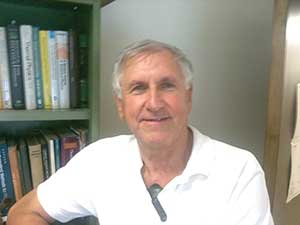Message from FIP Chair
International tensions are rising again, with talk of trade wars, perceived threats from immigration, and restrictions on human movements among nations. This is a change from the atmosphere in which we have carried out our thriving global physics programs in recent decades.
We physicists are not a major voting bloc nor an obvious component of any economies, and so cannot expect much direct influence on decision makers. But we can set a continuing good example of how cooperation and collaboration among humans leads to win-win intellectual successes, for the participants and for the national societies in which they live.
Consider the recent neutron star merger, first identified by the detection of gravitational waves. The third detector, VIRGO in Italy, did not see the gravitational wave. This was vital since the non-observation was due to a dead spot in the VIRGO angular sensitivity. Spherical trigonometry, just as practiced by sailing masters with their sextants, could thus give quite accurate directions in which to look. Quickly, remarkably quickly, a wide range of electromagnetic sensors around the globe were able to see the photons that emerged from that merger.
We, all members of our species, learned much from this wide band width of observations, which offers a good analogy for FIP. Humanity evolved among a wide range of social environments, which must have influenced how individuals see and think. This is a wide bandwidth of seeing and thinking, and as physicists, we can use this for new insights, or even methods of gaining insights. Only by establishing connections, best as face-to-face, can physics gain the benefits of thinking bandwidths.
Also of course, the costs of carrying out our studies have become obvious to these decision makers, who should also see the financial advantages of collaboration. Trade wars and restrictions on sharing technologies will certainly have a great impact on the way we carry out many physics projects. We must make clear the many advantages to all of us in our intellectual collaborations.
How can FIP help physics and physicists navigate the new times? We have our invited sessions at APS meetings, which can serve as splendid examples of successes based upon the talents of all of us. We can even have good metrics, of papers with wide-ranging co-authorships, and even occasional headlines such as gravitational waves. The examples of such invited sessions is covered elsewhere in this newsletter, so can may judge for yourself if we are making any gains. FIP also sponsors and organizes international travel for young people via our Distinguished Student Program, and IRTAP, which provides at least seed money for international collaborations. These programs could grow, in volume and in impact, if we can access wider financial support from among other APS units.
Our craft of physics has a huge advantage over even other scientific endeavors, since we have attained a superconducting state in recent years. Data, questions, tentative answers and such now propagate at c, using the bandwidths of modern technology. And, most of this traffic is even in English! FIP has many advantages, and must continue with all of our established programs, and to seek new ways of aiding the global quest for understanding of our universe, on all scales of length and time, using all available talent.

